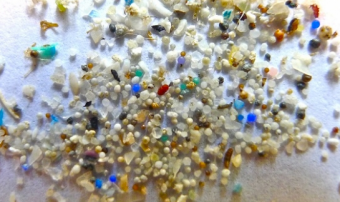
More than eight trillion microbeads—small plastic bits of polyethylene used in some face/cosmetic products and even toothpaste—have entered the water in the U.S. (and many more occupy the world’s water supply). In fact, it’s such an issue, that researchers from all over the world are trying to get lawmakers to do something about it.
Unable to biodegrade, these microbeads are often ingested by both animals and people because they are too small to be caught by filtration systems, slipping through sewage treatment and returning to the water, where they cause plastic pollution in the oceans, lakes, and rivers. Perhaps most notably, fish are consuming the plastic at an alarming rate, and humans are in danger of consuming them through the water system and the fish that they eat.
Some Bans in Place, But Not Enough
Some states (such as Illinois, California, New Jersey, Colorado, Maine, Wisconsin, etc.) have passed legislation banning the use of the microbeads in personal care products, but some of these bans are easy to get around due to loopholes. And unfortunately, this state ban list does not yet include Louisiana. By encouraging legislators in the state to ban their use and being careful about which products you purchase, you can help move the state forward for the sake of public health.
The Microbead-Free Waters Act of 2015
A bill was introduced in Congress earlier this year that would block the widespread use of the microbeads, specifically banning cosmetics that contain the synthetic plastic materials as of 2018. However, some companies have taken the lead on getting rid of or limiting the synthetic material in their products. Although alternatives exist, they are reportedly more expensive.
Additional Health Concerns
Some legislators have also urged the Food and Drug Administration to evaluate the use of these beads in toothpaste and gum due to their potential to become lodged in between teeth and trap bacteria. Microbeads also pose a problem because other compounds cling to them when they pass through the water system. Some dentists are also concerned that they facilitate the buildup of plaque and tartar because they can get stuck under the gums.
Harrell & Nowak
Companies and landowners in Louisiana sometimes violate federal, state and local environmental laws that regulate the discharge of toxic wastes and other pollutants into the environment. Sometimes the company or person in charge decides that it’s cheaper to pollute than to prevent toxic and chemical exposure to innocent people. Having spent years litigating against these bad actors and negligent parties, the attorneys of Harrell & Nowak can be your environmental hazards lawyer in New Orleans, Metairie, Kenner, and other areas throughout Louisiana.
